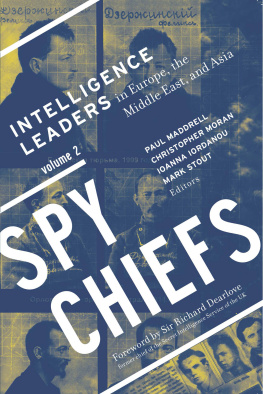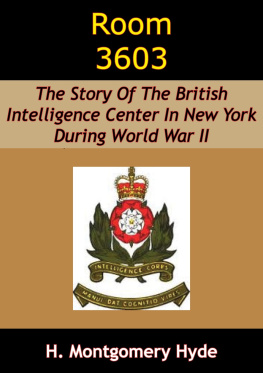SPY CHIEFS
Volume 2
Also from Georgetown University Press
The Image of the Enemy:
Intelligence Analysis of Adversaries since 1945
Paul Maddrell, editor
Intelligence Elsewhere:
Spies and Espionage outside the Anglosphere
Philip H. J. Davies and Kristian C. Gustafson, editors
Soviet Leaders and Intelligence:
Assessing the American Adversary during the Cold War
Raymond L. Garthoff
SPY CHIEFS
Volume 2
INTELLIGENCE LEADERS
in Europe, the Middle East, and Asia
PAUL MADDRELL
CHRISTOPHER MORAN
IOANNA IORDANOU
MARK STOUT
Editors
Foreword by
SIR RICHARD DEARLOVE,
former chief of the Secret Intelligence Service of the United Kingdom
2018 Georgetown University Press. All rights reserved. No part of this book may be reproduced or utilized in any form or by any means, electronic or mechanical, including photocopying and recording, or by any information storage and retrieval system, without permission in writing from the publisher.
The publisher is not responsible for third-party websites or their content. URL links were active at time of publication.
Library of Congress Cataloging-in-Publication Data
Names: Moran, Christopher R., editor. | Stout, Mark, 1964 editor. | Iordanou, Ioanna, editor. | Maddrell, Paul, editor.
Title: Spy chiefs / Christopher Moran, Mark Stout, Ioanna Iordanou and Paul Maddrell, editors.
Description: Washington, DC : Georgetown University Press, 2018. | Includes bibliographical references and index. | This book grew out of two academic meetings. The first was a panel, organized by Paul Maddrell, on Intelligence Leaders in International Relations at the 55th annual convention of the International Studies Association in Toronto, Canada, in March 2014. This led to a second, a conference entitled Spy Chiefs: Intelligence Leaders in History, Culture and International Relations, which was organized by Christopher Moran and his colleagues at Warwick University and held at the Palazzo Pesaro Papafava in Venice, Italy, in May of that year. The purpose of these meetings was to discuss the leadership of intelligence and security agencies; what good leadership of such agencies is and what impact it has had on the performance of the agencies concernedPreface to volume 1. | Description based on print version record and CIP data provided by publisher; resource not viewed.
Identifiers: LCCN 2017008735 (print) | LCCN 2017012716 (ebook) | ISBN 9781626165182 (volume 1 : hc : alk. paper) | ISBN 9781626165199 (volume 1 : pb : alk. paper) | ISBN 9781626165205 (volume 1 : eb) | ISBN 9781626165212 (volume 2 : hc : alk. paper) | ISBN 9781626165229 (volume 2 : pb : alk. paper) | ISBN 9781626165236 (volume 2 : eb)
Subjects: LCSH: Intelligence serviceCongresses. | Intelligence serviceHistoryCongresses. | EspionageCongresses. | EspionageHistoryCongresses. | International relationsCongresses. | LeadershipCase studiesCongresses.
Classification: LCC JF1525.I6 (ebook) | LCC JF1525.I6 S635 2018 (print) | DDC 327.12092/2dc23
LC record available at https://lccn.loc.gov/2017008735

This book is printed on acid-free paper meeting the requirements of the American National Standard for Permanence in Paper for Printed Library Materials.
19 18 9 8 7 6 5 4 3 2 First printing
Printed in the United States of America
Cover design by Faceout Studio, Spencer Fuller. Cover images courtesy of Wikimedia Commons / public domain.
This book is dedicated to the memory of one of its contributors,
Dr. Chikara Hashimoto (19752016),
a dedicated scholar with a passion for the study of intelligence
and a good and delightful man.
May he rest in peace.
CONTENTS
by Sir Richard Dearlove, KCMG, OBE
Paul Maddrell
Paul Maddrell
Ioanna Iordanou
Emrah Safa Grkan
Iain Lauchlan
Paul Maddrell
Kristie Macrakis
Bodo V. Hechelhammer
Paul M. McGarr
Chikara Hashimoto
Dina Rezk
Paul Maddrell
FOREWORD
The characteristics of leadership are elusive, but we seem to know instinctively when we see it done well or badly. Explaining leadership is always difficult. Great leadership is a complex mix of personality, innate capability, favorable circumstances, and the right opportunities. Great historical leaders largely defy categorization. They are one-offs who find themselves in the right place at the right time, and they have probably sown as much tragedy in the world as they have brought about beneficial outcomes. At a more prosaic level we are all thoroughly familiar with good and bad leadership in most aspects of our lives that depend on the performance of a team or group, but explaining the chemistry of the group or how the individuals that make up the group interact and allow themselves to be led often defies logical analysis.
The leadership of intelligence and security is a particularly esoteric and challenging area of study, and equally elusive. This is because the services themselves vary enormously in role and function between different countries and the place that they occupy in government. It is therefore essential to make a fundamental distinction between the leadership of these services in democratic states that are fully accountable politically and legally, and in authoritarian states or dictatorships where they are usually an intimate part of the structure of power and repression, and operate without any of the legal and political controls that we take for granted in most Western liberal democracies. Any direct comparison, therefore, between the responsibilities and performance of, for example, the director of the CIA and his Russian opposite number, the director of the SVR, would be invidious. Perhaps a small amount of common ground might be found in how successful each service is in collecting intelligence on major requirements, but the cultural gulf between them is in reality too wide to be bridged. The essays in this collection do bring out this key difference.
I will therefore outline the special problems, not well understood outside the intelligence community, that pertain to leadership of an intelligence service in Western liberal democracies in the twenty-first century. This, I hope, will provide scholars with a template for making more informed judgments about this area of research.
Complete intelligence services (that is, services that collect and analyze intelligence and have a full range of operational capabilities) are always highly compartmentalized with strict need-to-know procedures. The existence of successful operations, especially the identity of sources, will be carefully hidden except from those staff who really do need to know about them. Even very senior officers will not know about them; only at the very top will there be a complete picture of the services activities. The leadership cannot, therefore, build a narrative around the organizations current success. This means that a key ingredient is necessarily lacking when it comes to building a team, motivating its members, and promoting its performance. This situation is probably unique to intelligence services and underlines the day-to-day challenge of running an organization whose currency is its ability to keep its biggest successes completely secret for as long as they remain valuable. Imagine leading a business that could not use its success to promote itself and where anything that goes wrong risks attracting an excessive amount of media attention. Failures are widely broadcast and endlessly discussed, successes are very seldom even heard about. The leadership must therefore build a cohesive and positive service culture using other meansfor example, by emphasizing a sense of specialness and exclusivity through pride in belonging to an elite organization, through judicious use of service history (that is, past casework that can be discussed), and insistence on the very highest professional standards.











 This book is printed on acid-free paper meeting the requirements of the American National Standard for Permanence in Paper for Printed Library Materials.
This book is printed on acid-free paper meeting the requirements of the American National Standard for Permanence in Paper for Printed Library Materials.